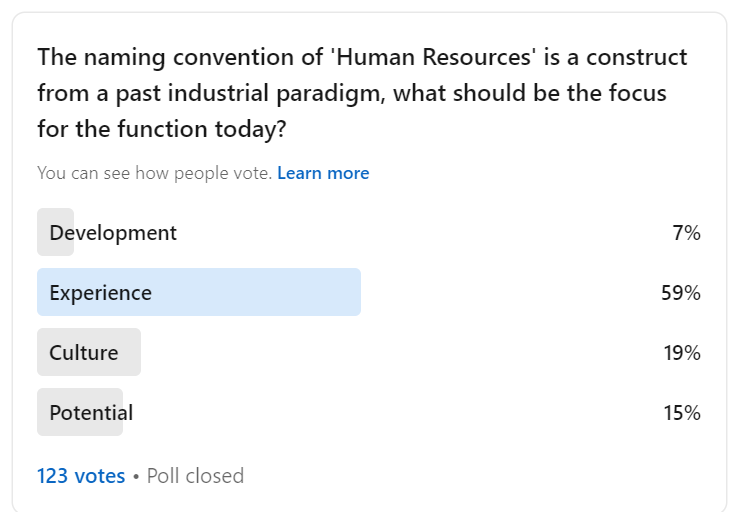In its current guise, HR risks being obsolete in the next 5 years
SHARE THIS ARTICLE

Whether or not HR needs a rename, a rebrand, a reset, or whatever has been a popular topic lately. The impact of COVID-19 and flexible working, the elevation of HR in daily business operations, and a renewed focus on the future of work have brought this topic into the spotlight. And rightfully so. It’s long overdue.
I’ve read and listened to a lot of what’s been written on this topic. Much of it I agree with – that HR needs to reposition itself if it’s going to continue to be relevant to the humans and organisations it supports. But it’s not simply a reposition or a rebrand – we have to alter how we function, the work we perform, and how we support people and organisations.
Our current state
I was fortunate to attend some of our industry’s highly anticipated and much-respected conferences over the past few months: the L&D HR Symposium in the Hunter Valley, NSW, and the Future Talent Council’s global event in Stockholm. And they got me thinking hard on this topic, but not in the way I was anticipating.
Both were well-run events. Artificial intelligence (AI) was unsurprisingly covered, and covered well. So was the need to move towards skills and development-based workforce strategies. There were some great case studies and valuable insights shared that will be useful for me and my consulting work. As always, both events provided great opportunities to network and meet interesting people from a range of industries and regions.
However, I came away from both events feeling there was a lost opportunity for “deeper thinking” on the future of the HR function.
As an industry, together with an overdue need to rewire our function, we are leaning into an unprecedented period. The seismic macro-environmental, cultural and demographic shifts that businesses, economies and societies are experiencing – including the global skills shortages, AI and automation’s effects on workers and economies, geopolitical unrest and risk, consumer and employee expectations for positive social impact of business – are all generating pressure and opportunities for the HR function.
These events led me to think more about whether the HR industry should spend more time considering whether the current HR paradigm is fit for purpose in today’s world or whether a radical reorientation is required to deliver better outcomes for business, workers and society.
So, if we’re in agreement that this reorientation is needed now, what should it look like?
A rebrand for HR is long overdue
We call the function “human resources”, but this naming is based on an outdated concept of work, with workers or “resources” being hired and deployed as inputs to production. Our very name perpetuates an expectation of what the function should be doing, and it’s time that we challenge this.
Just think what perceptions would look and feel like if the function was called “human potential”, or “human development”, or “human experience”. These are simply early ideas, so don’t hold me to them, but our function now requires a name that reflects the possibilities that people bring to an organisation. Humans no longer think of work as a way to earn a living. Humans want to work for organisations that reflect their values, are excellent corporate citizens and support their entire potential – as a worker and a person.
With that in mind, the HR function needs a reorientation – and within that, a name – that communicates what a company can do for its people rather than what the people can do for the company. HR needs a name that communicates how it helps workers become who they want to be, and how they want their work and work potential to be a part of that.
The same point can be made about “talent acquisition”. It’s time to move on from thinking people are something that a business “acquires” like assets and property. They are humans with goals, dreams and aspirations, and they are choosing whether your business is worthy of being part of their career and life journey.
You may think I’m digressing, but the point here is that our name belies our purpose. The way we refer to ourselves as an industry is outrageously outdated, so how can we expect to be future-fit if something as essential as how we refer to our function is wrong? This is a foundational question: a new name is essential to communicate what we do, who we serve, the relationships that matter and the outcomes we deliver.
What does the industry say?
This topic was generating significant discussion within my team at TQ, so I ran a poll on LinkedIn to open it up to the industry.
Below is an extract from LinkedIn of my question and the poll’s results:

The post resulted in some great discussion and perspectives and is worth reviewing, but here are a few verbatims from senior HR professionals from PwC, KPMG, Bapcor, and others:
“Gareth Flynn, I think in our complex world, we need to use naming of things to simplify – i.e. reduce the cognitive load and/or create the question ... ‘yes that’s your name, but what do you do?’ On that basis, I am big fan of employee experience – because it defines (in the broadest sense of definition of employee) the relationship we have with the organisation that pays us for the value we create. People is too generic, worker has IR connotations, humans feels ‘new age’ and so easily dismissed.” (Lynette Nixon, managing director, PwC)
“I see these all as pathing stones, on the path to human potential. First, we need to get the culture and experience right though to prime the environment for potential to be unlocked. I don’t mind keeping human, keeping the lens of humanity today is important.” (Katharine Coombes, global head of TA, Marriott)
“Here at KPMG, ‘HR’ is referred to as people and inclusion, which I really like. I also like the simplicity of people experience (PX) as a naming convention.” (Claire Planinsek, former TA transformation lead, KPMG)
“There is also a great discussion to be had about ‘talent’ – this implies (I think) a judgement. That people are ‘talent’, or not. ‘Top talent’ programs sharpen this focus. Organisations are communities. We need to be careful about the language we use and the unintended consequences.” (Merryl Dooley, chief people and culture officer, Bapcor)
The term HR is clearly redundant
Based on the poll results and the discussion that followed, it is clear there is a ground-swell for change. It’s also interesting to note that there was no one who challenged the renaming and wanted to keep “HR” in its current guise.
Overwhelmingly, 59 per cent voted for “Experience” in the functional naming convention. This is not surprising given the shift towards “employee” and “candidate experience” in the past few years, as talent attraction and retention has become a higher priority. A broader focus to include the experience of “leaders” as well as the participants of the function is also critical, and this focus may miss these stakeholders. After all, they are critical “customers” of the functional work, too.
I’m not going to try to solve the renaming issue here as it will be contextual for different organisations and their business priorities, but a move towards “experience” is likely to be important. With this as the functional north star, it will change the work that gets done and the skills and capabilities needed within the function. Think “experience design”, or “product management”, or “performance analytics”, or “customer/stakeholder research and analytics”. A simple reframe changes the game completely.
Gareth Flynn is the founder and managing director of TQSolutions.
